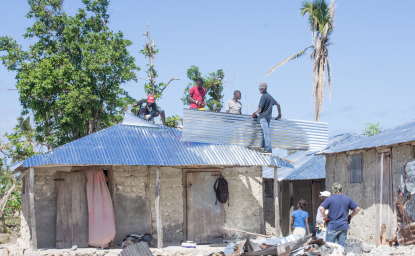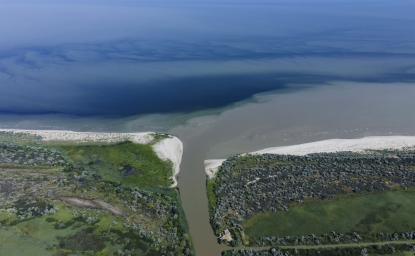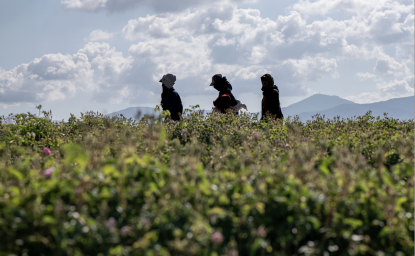An Oasis in the Desert: Navigating Peace in the Okavango River Basin
ECSP's Water Working Group II turns water into peace in the Spring 2004 issue of PECS News
ECSP's Water Working Group II turns water into peace in the Spring 2004 issue of PECS News
By Anton Earle and Ariel Méndez
One of the last unindustrialized rivers in the world, the Okavango River drops from its headwaters in Angola down to the wide, flat delta in Botswana, crossing Namibia's Caprivi Strip on its 1,100 km journey south to the Kalahari Desert (Nicol, 2003). This pristine environment is home to myriad species of animals and plants that have escaped the impact of modern industrial and municipal human development.
Yet the three basin states—Angola, Namibia, and Botswana—face pressing developmental needs that place demands on the fragile river environment, and, even more devastatingly, could raise the specter of conflict among these water users. As Angola emerges from over twenty-five years of civil war, the river could be the wellspring of new development in its battle-scarred southern region. But first, these three states must agree on how to balance their water needs. Not only could these negotiations prevent conflict, but the ongoing dialogue may also promote peace and regional integration in Southern Africa.
Instead of flowing into the sea, the Okavango discharges its fresh water into the Kalahari desert, fanning out over 15,800 km2 during the flood season to form the largest inland delta in sub-Saharan Africa. A maze of swamps and grasslands, the delta nurtures hundreds of varieties of birds, fish, and mammals, including zebras, lions, elephants, hippos, and giraffes. The Okavango basin itself covers an area of some 413,550 km2 across the three countries (Ashton & Neal, 2003). An estimated five hundred thousand people make their homes in the basin, and another few hundred thousand people displaced by Angola's civil war could potentially return to the headwaters region over the next decade.
In most of the basin, residents earn a living from small-scale farming, fishing, hunting, producing charcoal, and harvesting fruit, reeds, and timber; however, these activities are banned in areas that have been declared nature conservancies. Poverty and unemployment are rife, and are accompanied by other social ills such as alcohol abuse, illiteracy, and, most significantly, HIV/AIDS. Due to villages' isolation, lack of institutional capacity, and underlying poverty, services are inadequate or infrequent.
Delta Blues
As Angolan refugees return to the water-rich region formerly dominated by UNITA rebels, the country's priorities are "people, land mines, and then environment," according to Isidro Pinheiro, Angola's OKACOM commissioner. The civil war devastated Angola's communities, which suffer from starvation, lack basic infrastructure, and are infested with land mines and unexploded ordnance. However, water is relatively abundant in Angola, and using those resources could help it build a sustainable economy. Although the Angolan government views tourism as a way to improve its citizens' standard of living, attracting visitors to its portion of the basin will not be easy, as the war destroyed its transportation system, bushmeat hunting decimated indigenous animal life, and unexploded ordnance make the region nearly impenetrable. The Angolans need to generate livelihoods, clear land mines, and increase institutional capacity to make the region more hospitable for their citizens.
As the only exploitable perennial river running through the nations of Namibia and Botswana, the Okavango is under demand by both countries (Turton, Ashton, & Cloete, 2003). Namibia, one of the most arid countries in Southern Africa, sees the river as a source for municipal, industrial, and agricultural uses, and national leaders are considering building a 250 km pipeline to bring a small portion of the river's flow to the capital city of Windhoek to increase its supplies of freshwater. According to Namibia's Ministry of Agriculture, 250,000 people outside the Kavango region will need future access to water from the Okavango to sustain their socioeconomic activities (Pinheiro, Gabaake, & Heyns, 2003). Not that Namibians in the Kavango region enjoy socioeconomic stability: over 70 percent are unemployed, and three quarters of the region's households spend over 60 percent of their income on food.
Botswana's leaders want to preserve the delta's status quo to increase tourism; in 1996, Botswana unilaterally registered the delta as a Ramsar Wetland of International Importance without consulting its upstream neighbors. Botswana's conservation efforts have limited inhabitants' traditional hunting, farming, and fishing rights, so now many rely on income from providing services to tourists who visit the upscale lodges located in the delta. Although Botswana earns significant revenue from these lodges, local communities have not received a concomitant increase in living standards; many villages lack basic health care and educational opportunities.
Navigating Peace in the Okavango
Despite pursuing mixed and sometimes contradictory objectives, the Okavango River Basin users have not resorted to violence to control this valuable resource; instead, the three states have made a concerted effort to manage their competing demands. In 1994, the governments of Botswana, Angola, and Namibia agreed to form the Permanent Okavango River Basin Water Commission, known as OKACOM, to manage the river basin. Due to vast distances and lack of transportation in the region, OKACOM can only officially meet once a year; some representatives must travel for three days to attend.
In October 2003, the Woodrow Wilson International Center for Scholars' Environmental Change and Security Project (ECSP), Green Cross International, and the African Water Issues Research Unit convened a meeting in the Okavango Delta to discuss OKACOM's progress and identify the major challenges facing cooperation in the basin. Representatives from each member state, regional researchers, local stakeholders, and tourism operators met with members of ECSP's Navigating Peace Water Working Group on the Future of Water Conflict and Cooperation. This small group is comprised of international experts on water and conflict resolution.
Sharing Water, Sharing Benefits
The conference had three objectives:

The Environmental Change and Security Program (ECSP) explores the connections between environmental change, health, and population dynamics and their links to conflict, human insecurity, and foreign policy. Read more



